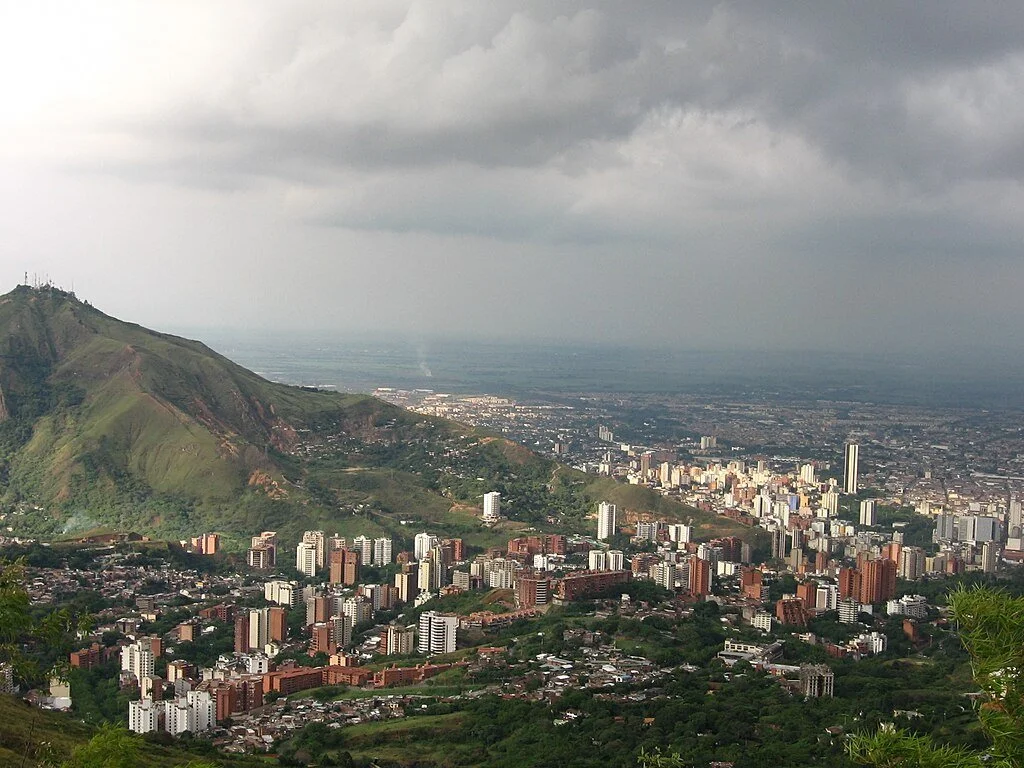Salsa: a potential aid in the healing process for survivors of sexual assault
Cali view from mountain, by Michielvd. CC BY-SA 3.0 via Wikimedia Commons
CN: Sexual violence
As the decades-long internal conflict in Colombia winds down, one NGO is harnessing the therapeutic power of salsa to combat the high levels of gender-based violence.
Cali, Colombia. The salsa capital of the world which boasts more salsa schools and salsa dance groups than any other city in the world. A refuge for musicians following the Cuban Revolution in 1959, the salsa boom of the 1970s perfectly matched the upbeat, party atmosphere of the city. Whether it’s under the dazzling lights of the Feria de Cali, or in the more relaxed nightclubs, salsa caleña is a six-decade long testament to Cali’s cultural diversity: a lightening-fast blend of Afro-Cuban, boogaloo, and cumbia styles.
But the last sixty years have not been a whirl around the dance floor for Colombia. Since the 1960s, the Colombian government has been engaged in a near-constant conflict with right-wing paramilitary groups, crime syndicates and left-wing guerrilla groups. Sexual violence became a ‘habitual, widespread, systematic and invisible practice’ over the half a century of internal conflict. Despite the landmark peace agreement between the government and the Revolutionary Armed Forces of Colombia (FARC) in 2016, these crimes have continued against the backdrop of periodic clashes. In 2022, a national Truth Commission was established to shed light on decades of atrocities. A justice report from September of last year announced that, in light of the Commission’s findings, at least 35,178 people had suffered gender-based violence from 1957 to 2016, though the figure is likely to be much higher given that these types of crimes tend to go unreported.
Back in Cali, one NGO is seeking to combat these horrifying statistics in the true caleño fashion. Mi Cuerpo es Mi Historia, or, My Body is My Story uses art and performance as a vehicle to promote mental and physical health in children and adolescents from vulnerable socio-economic backgrounds. The combination of research-led creative therapies such as Dance Movement Therapy (DMT), along with psycho-therapy interventions help these young people, often victims of child abuse, grow their ‘capacity for resilience and empowerment’.
Working with survivors is a delicate task given the flirty, even intimate connotations of the partner dance. A challenge that the nonprofit’s director, Martha Isabel Córdoba Arévalo, is keenly aware of. The trained psychologist and salsa teacher addresses the risk of ‘re-traumatisation’ by avoiding direct contact between dancers, using larger coordinated dance groups instead. In her small-group workshops, Arévalo found that direct work with the body ‘evidenced emotional pain, which was located in different parts of the body as if they were ghostly marks of the most difficult experiences’. So, if students do pair up, they practise ‘mirroring’, a DMT technique where dancers follow their partners’ moves from a distance.
Arévalo’s methodology seems to echo the very core of Dance Movement Therapy, which recognises body movement ‘as an implicit instrument of communication and expression’. A 2019 analysis of 41 studies published in Frontiers in Psychology found that DMT ‘decreases depression and anxiety and increases […] interpersonal and cognitive skills’.
Although few studies have been carried out on the impact of DMT on young victims of sexual trauma —particularly given the ethical implications of such research— Mi Cuerpo es Mi Historia’s dance intervention programme exercises extreme sensitivity and caution. It is the result of over 15 years’ research and practice, on which Arévalo has written several publications in Psychology reviews. In an interview, Arévalo has stressed that there is no simple resolution to sexual violence: ‘you need time and resources, and you need trained professionals’.
But clearly, for this nonprofit, there is something more to salsa therapy than just clinical efficacy. Their approach is holistic and seems to invest in long term independence and resilience. One pathway offers the opportunity for sexual assault survivors to train to become salsa instructors, giving them the opportunity to tap into Cali’s world-famous salsa industry and their tourism boom.
Cali’s famous ‘Festival Mundial de Salsa’. CC BY-SA 4.0, via Wikimedia Commons.
The UNFPA, a United Nations sexual and reproductive health agency which operates in Colombia advocates for this sustainable, ‘needs-based’ approach. It is a sure sign that, while Colombia may have a long way to go, the country is coming to terms with its violent past which has disproportionately affected —and continues to affect women and girls.
‘Sexual violence destroys lives and violates human rights. It must not be ‘normalized’ as something that is destined to happen, something that cannot be stopped,’ says UNFPA Executive Director Dr. Natalia Kanem.
Recent sociological and psychological research indicates that sexual assault disrupts the anchors of individual and cultural identities. Across the charity, salsa is a unifying force that affirms a sense of collective identity. Salsa is part of Cali’s cultural heritage, but as Mi Cuerpo es Mi Historia makes clear, their therapeutic and pedagogical methodology promotes a ‘humanisation’ of salsa. Salsa is not just a commercialised spectacle; their aim is to return the power to the dancer, not the spectator. If dance and movement in this setting facilitates the expression of trauma, creativity, individuality and power, then salsa grounds the individual in a vibrant, collective, truly caleña identity.

